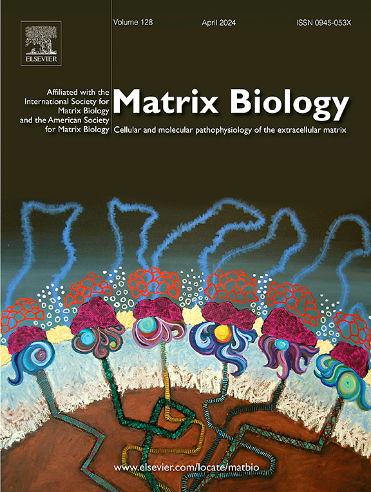Anticancer effect of a single-chain variable fragment against pro-matrix metalloproteinase-7 in colon cancer
IF 4.5
1区 生物学
Q1 BIOCHEMISTRY & MOLECULAR BIOLOGY
引用次数: 0
Abstract
Disrupting the interaction between matrix metalloproteinase-7 (MMP-7) and syndecan-2 (SDC-2) can yield anticancer effects in colon cancer cells. Here, a single-chain variable fragment (scFv) targeting the pro-domain of MMP-7 was generated as a potential candidate anticancer agent. Among the generated scFvs, those designated 1B7 and 1C3 showed the strongest abilities to inhibit the ability of MMP-7 pro-domain to directly interact with SDC-2 in vitro and decrease the cancer activities of human HT29 colon adenocarcinoma cells. Consistently, 1B7 and 1C3 inhibited the cell-surface localization of pro-MMP-7, reduced the gelatinolytic activity of MMP-7, and suppressed the cancer activities of metastatic HCT116 human colon carcinoma cells. Notably, 1B7 inhibited the primary tumor growth and lung metastasis of CT26 mouse colon cancer cells in a mouse model. Compared to 1B7, the 1B7-Fc fusion antibody showed better anti-tumorigenic activity against HCT116 cells in culture and a syngeneic mouse model. Together, these data suggest that 1B7-Fc exerts anticancer effects by interfering with the interaction of MMP-7 and SDC-2 and could be a promising therapeutic antibody for colon cancer.
单链可变片段对结肠癌前基质金属蛋白酶-7的抗癌作用
破坏基质金属蛋白酶-7 (MMP-7)和syndecan-2 (SDC-2)之间的相互作用可以在结肠癌细胞中产生抗癌作用。本研究生成了一个靶向MMP-7前结构域的单链可变片段(scFv),作为潜在的候选抗癌药物。在所生成的scFvs中,1B7和1C3在体外抑制MMP-7前结构域与SDC-2直接相互作用的能力最强,并能降低人HT29结肠癌腺癌细胞的癌变活性。同样,1B7和1C3抑制了MMP-7前的细胞表面定位,降低了MMP-7的溶胶活性,抑制了转移性HCT116人结肠癌细胞的癌变活性。值得注意的是,在小鼠模型中,1B7抑制CT26小鼠结肠癌细胞的原发肿瘤生长和肺转移。与1B7相比,1B7- fc融合抗体在培养和同基因小鼠模型中对HCT116细胞表现出更好的抗肿瘤活性。综上所述,这些数据表明1B7-Fc通过干扰MMP-7和SDC-2的相互作用发挥抗癌作用,可能是一种有前景的结肠癌治疗抗体。
本文章由计算机程序翻译,如有差异,请以英文原文为准。
求助全文
约1分钟内获得全文
求助全文
来源期刊

Matrix Biology
生物-生化与分子生物学
CiteScore
11.40
自引率
4.30%
发文量
77
审稿时长
45 days
期刊介绍:
Matrix Biology (established in 1980 as Collagen and Related Research) is a cutting-edge journal that is devoted to publishing the latest results in matrix biology research. We welcome articles that reside at the nexus of understanding the cellular and molecular pathophysiology of the extracellular matrix. Matrix Biology focusses on solving elusive questions, opening new avenues of thought and discovery, and challenging longstanding biological paradigms.
 求助内容:
求助内容: 应助结果提醒方式:
应助结果提醒方式:


